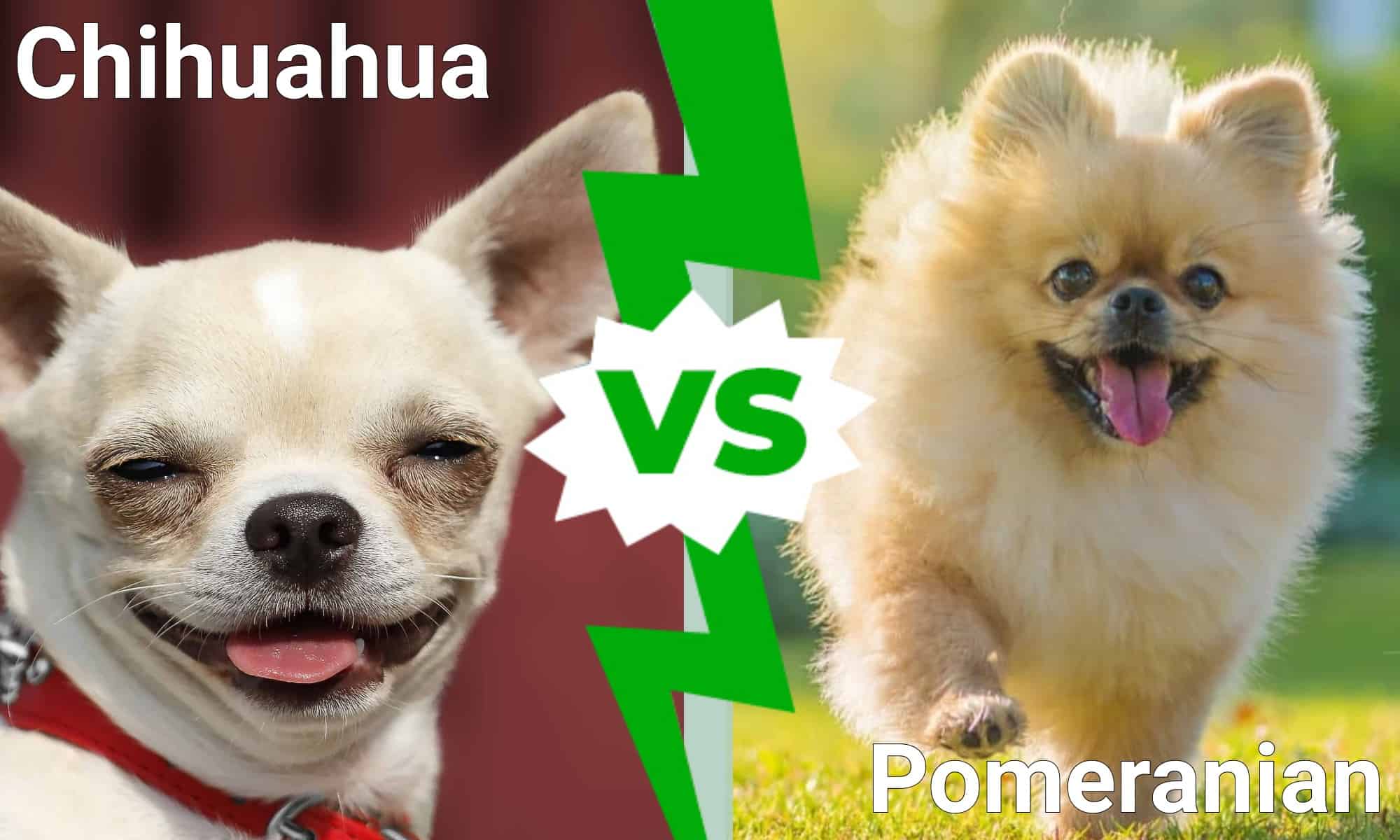Are you looking to introduce a furry companion into your life? If so, consider getting a Pomeranian or Chihuahua. These small dog breeds make wonderful indoor pets that can easily fit in with your lifestyle. Plus, having either of these two pups around can benefit your mental and emotional health, as they are always ready to lend a paw of attention and love whenever you need it!
However, before settling on one breed, do your research. This way, you’ll have an accurate idea of what having a Pomeranian vs. Chihuahua entails. What is the temperament of a Chihuahua like? How often should you train a Pomeranian? What are some helpful grooming tips for a Pomeranian? How long is the lifespan of each breed? Below, we’ve provided an overview of the differences between Chihuahuas vs. Pomeranians.
What is a Chihuahua?
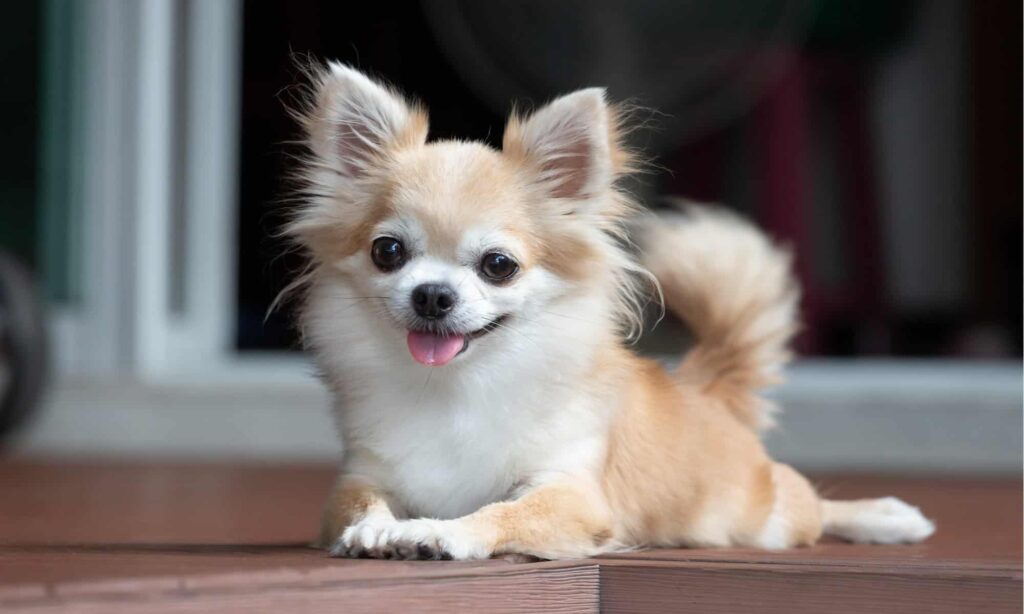
Chihuahuas are small dogs with big personalities.
©Ratchat/Shutterstock.com
Chihuahuas are delightful small-sized purebred dogs known for their impressively loyal personality. If you’re looking for a dog that craves attention and love from its human companions, you’ll enjoy owning a Chihuahua. It has a highly playful nature, that makes it incredible to bond with.
When you get to know your pet Chihuahua, they may seem possessive of your attention; yet, their presence will be sure to bring entertainment and life into any room. To give a better insight on the alluring qualities that make this puppy stand apart from other breeds, here are some specific traits about them:
Social Temperament
Chihuahuas are excellent for first-time pet owners because of their prominent personalities and loving nature. Once you get a Chihuahua, you’ll realize they’re either timid and introverted or feisty and sociable.
The dog is usually ready and willing to accompany their owner everywhere, wagging their little tail in excitement. However, Chihuahuas can easily get separation anxiety, so avoid leaving them alone every day when you go to work. Instead, consider hiring someone to watch your furry little friend while you’re away.
Quick Training and Exercise
Despite their small size, mature Chihuahuas need a half-hour of exercise every day to stay strong and lively. Avoid overexerting your puppy if it is under three months old since its joints and muscles may still be too brittle. We strongly recommend that you play with the puppy instead to help their growing bones develop endurance.
You can start introducing walks into the dog’s routine once it’s four months old and above. Be sure to use a harness when taking your lovely Chihuahua for a walk to avoid damaging its windpipe and spine.
You should start training your Chihuahua as early as four months old. Doing so will ensure that it adapts to your lifestyle and grows to be become a pleasant, well-rounded social pet. Most Chihuahuas prefer to learn things at their own pace, so practice patience throughout the training period. Eventually, your pet will begin to respond to tricks and commands, gradually displaying its intelligence and independence.
What is a Pomeranian?
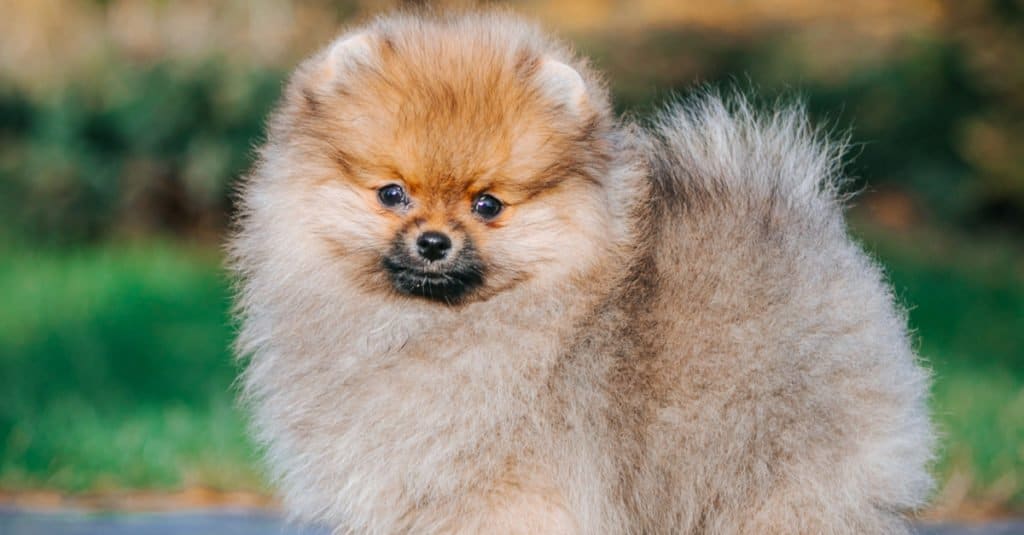
Pomeranians are playful, vocal dogs that make for a great furry companion.
©Eve Photography/Shutterstock.com
Pomeranians are a curious, flamboyant dog breed known for their playful nature, particularly with children. If you want a dog you can travel with because it comfortably fits in travel bags and is acceptable by most plane and train regulations, then a Pomeranian is your ideal travel buddy.
Pomeranians rose to popularity in the 18th century when Queen Victoria got one as a pet. Since then, the dog breed has been associated with various royal family members, making it one of Britain’s most expensive, luxurious dogs. Some unique traits of Pomeranians include:
Keen Temperament
Although Pomeranians are lively, friendly small dogs, they have a big attitude and may even challenge dogs bigger than them. It’s worth noting that this dog breed is especially vigilant and will often bark loudly at the slightest of changes in their environment.
Therefore, if your apartment has poor soundproofing, you’re bound to receive noise complaints from your neighbors due to the incessant barking. Pomeranians are also territorial, defensive dogs, that bark a lot whenever they hear strange noises outside.
Pomeranians enjoy cuddles as much as humans do. Anyone seeking a furry companion to provide companionship and emotional support will find the perfect pup in Pomeranians – they boast cozy, snuggly personalities that bring joy and fulfillment!
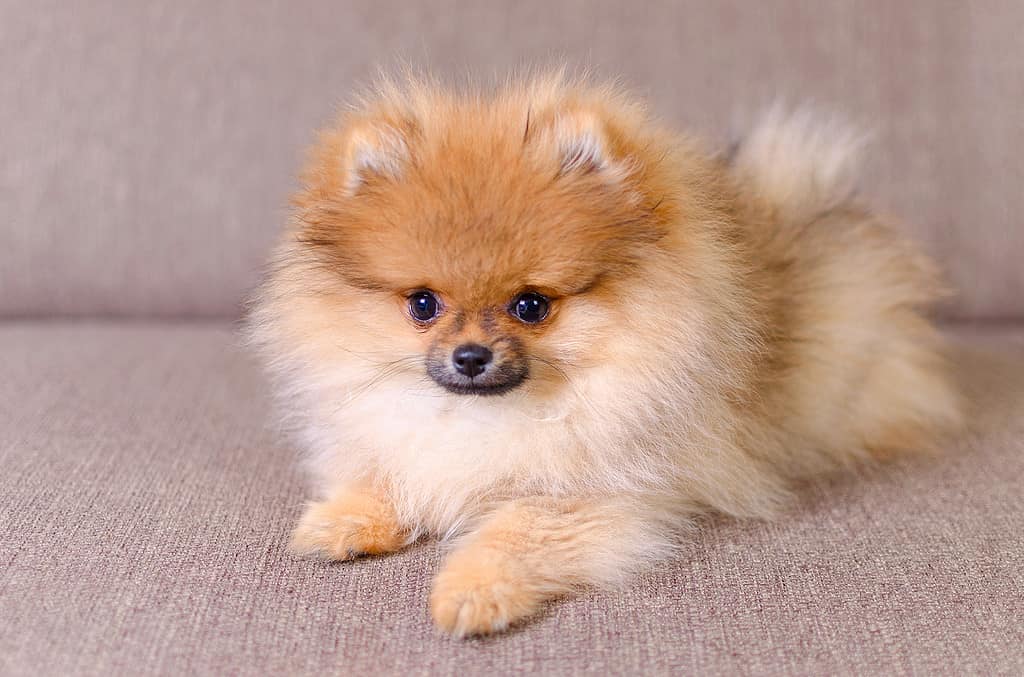
Pomeranians enjoy cuddles as much as humans do.
©iStock.com/nadisja
Easy Training and Exercise
If you want your Pomeranian to enjoy a long healthy life, ensure you exercise it by taking it out for at least two walks each day for about 20 minutes. Because Pomeranians are quite the active breed, keep a watchful eye over it when outdoors to prevent it from running off into traffic, getting lost, or landing in dangerous situations.
Excessive exercise can be detrimental to the growth and development of your Pomeranian companion. If you spy bruises on their hips or knees, it’s likely because they’ve been overexerting themselves–and that could have serious health repercussions down the line! Additionally, too much physical activity will cause them to overheat quickly, thereby posing a direct risk to their wellbeing.
We recommend training your dog while it’s still a young pup so it learns new things earlier on.
Comparison Between Chihuahua vs. Pomeranian
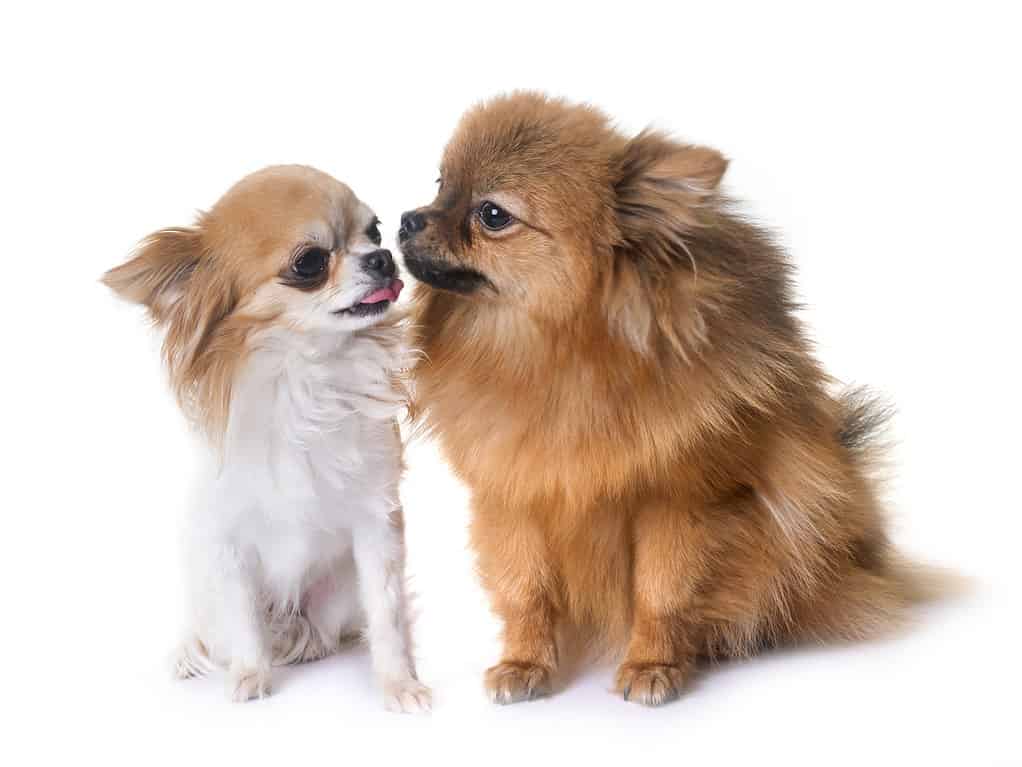
Pomeranians grow to be a little bit taller than Chihuahuas.
©iStock.com/cynoclub
Chihuahuas and Pomeranians are great breeds to own as pets because of their welcoming nature and exciting traits. Did you know that the Chihuahua has the biggest brain in the canine world? What about the fact that two Pomeranians survived the sinking of the Titanic ship?
Each of these dog breeds has its allure. Here’s a detailed comparison of the Pomeranian and Chihuahua.
Chihuahua vs. Pomeranian: Size and Appearance
The heights of the Pomeranian and Chihuahua are 11 and 10 inches respectively, while their weights are 3 and 2.7 kilograms. This shows that Pomeranians grow to be a little bit taller than Chihuahuas, even though both breeds have a similar general appearance. An adult Pomeranian may appear larger than its actual size because of its thick, furry coat. However, if you give it a short haircut, it may appear smaller than a Chihuahua.
Moreover, Pomeranians have erect, pointy ears with a face shaped like a fox’s, while Chihuahuas have big, upright ears and a domed-apple head shape.
Pomeranians have vibrant, colorful coats. Orange is a popular coat color for Pomeranians, though you may spot some dogs with red, blue or black coats that contain tan markings. On the other hand, Chihuahuas are usually unicolored with smooth fur.
Chihuahua vs. Pomeranian: Grooming
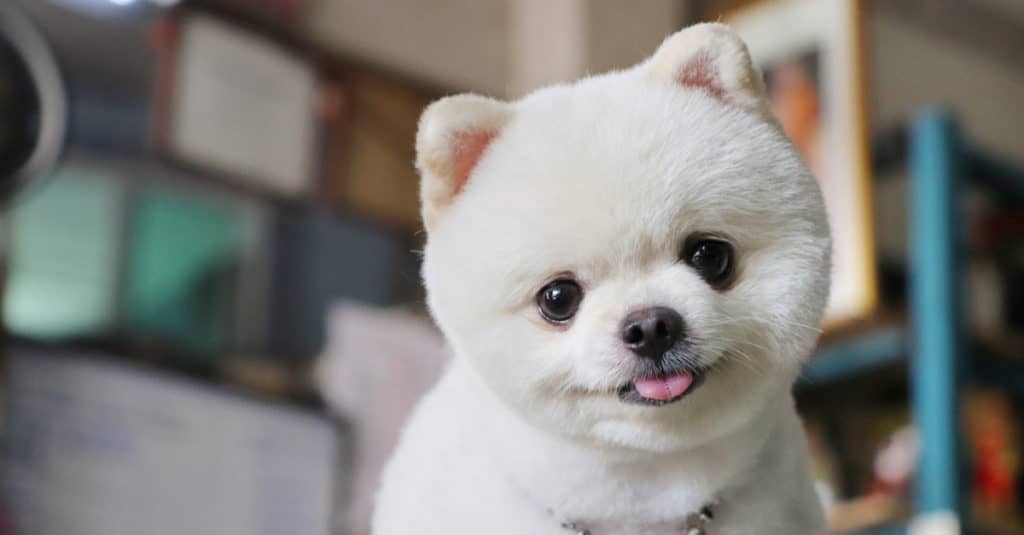
The coat of a Pomeranian requires a lot of maintenance in terms of washing, brushing, and trimming.
©Shawei26/Shutterstock.com
The radiant, colorful coat of the Pomeranian may be easy on the eyes, but it requires a lot of maintenance in terms of washing, brushing, and trimming. If you want your pup to maintain its attractive appeal, we recommend taking your Pomeranian to a qualified dog groomer after every 4 to 6 weeks.
Brush your dog’s coat several times throughout the week, more so during shedding season. Doing so will ensure your apartment isn’t filled with dog hair.
Brushing your pet’s fur coat frequently will ensure your dog’s coat is clean and tangle-free. In contrast, however, Chihuahuas are more manageable to groom than Pomeranians due to their short-haired coats that require brushing at least once every week.
Both breeds shed equal amounts of fur as a result of their double-lined coats. If you plan on adopting a hypoallergenic dog, then neither of these two breeds will be a good fit for you. Consider getting a dog breed whose fur doesn’t attract allergens if it plays outside.
Chihuahua vs. Pomeranian: Nutrition
Both Pomeranians and Chihuahuas have small stomachs. Adult Pomeranians eat one and a half cups of food per pound of weight, while adult Chihuahuas need only half a cup. The amount of food each dog consumes will depend on how active it has been throughout the day. If your Chihuahua has spent the entire day resting, then it will eat a lesser amount of food than if it played the whole day.
We recommend feeding both breeds great kibble-formulated food for their minute-sized body. When shopping for dog food, check the kibble made for small toy-sized breeds to ensure that you feed your Chihuahua or Pomeranian balanced nutrition to sustain them.
The kibble food contains the right amount of minerals, proteins, carbohydrates, vitamins, and omega fatty acids that your pet requires to live up to its entire lifespan.
Chihuahua vs. Pomeranian: Training
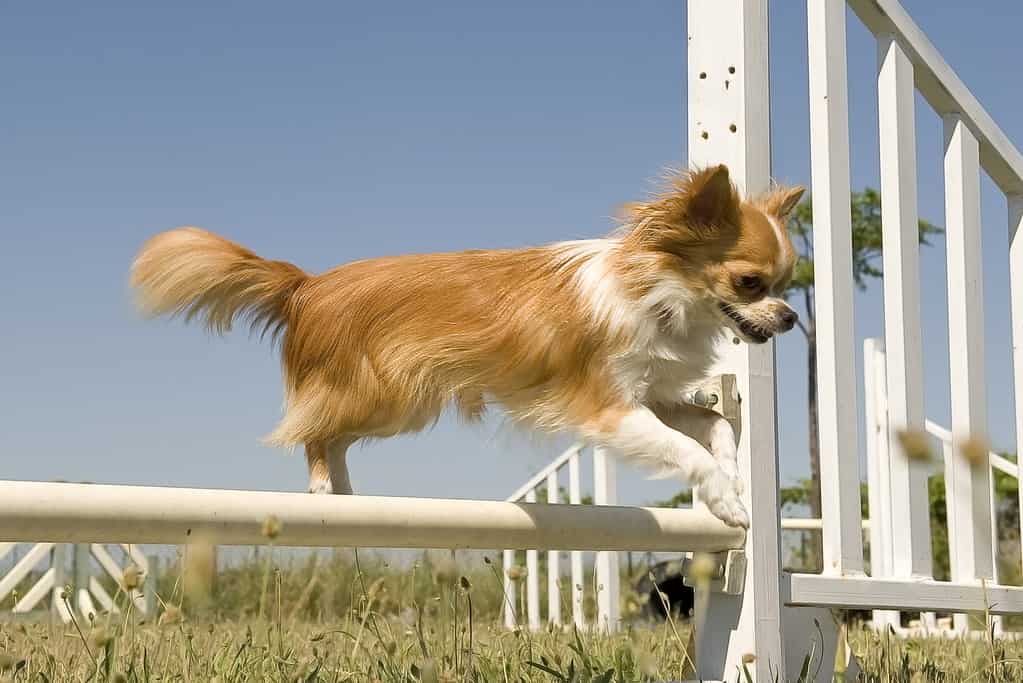
With patience and persistence your Chihuahua will begin to respond to tricks and commands, gradually displaying its intelligence.
©iStock.com/cynoclub
Both breeds have the same capacity for training, whereby they start as stubborn and eventually become obedient and responsive. However, you will require a lot of patience when training your Pomeranian or Chihuahua breed because both dogs like to maintain their independence, even as they try to learn your tricks.
Expect your pet to have days when they behave headstrong and refuse to listen to your commands for no reason. Luckily, the dog breeds compensate for their stubbornness with fierce loyalty and playfulness that will melt your heart. Nevertheless, if you want a well-behaved pet, train them while they are still young and reward positive behavior with delicious snacks as a form of positive reinforcement training.
If properly socialized and trained from a young age, both Pomeranians and Chihuahuas may get along with various dog breeds. A useful approach to training the dog is to take them to locations like the park where they can interact with various animals. Socializing will ensure that your Chihuahua or Pomeranian doesn’t bark uncontrollably at every dog or pet that comes across them.
Chihuahua vs. Pomeranian: Lifespan
A dog with a large body scientifically lives less time than a smaller dog. This means that your adorable Chihuahua can live for 15 whole years maximumly. On the other hand, a Pomeranian with excellent health and a balanced diet routine can reach 20 years.
Chihuahua vs. Pomeranian: Exercise
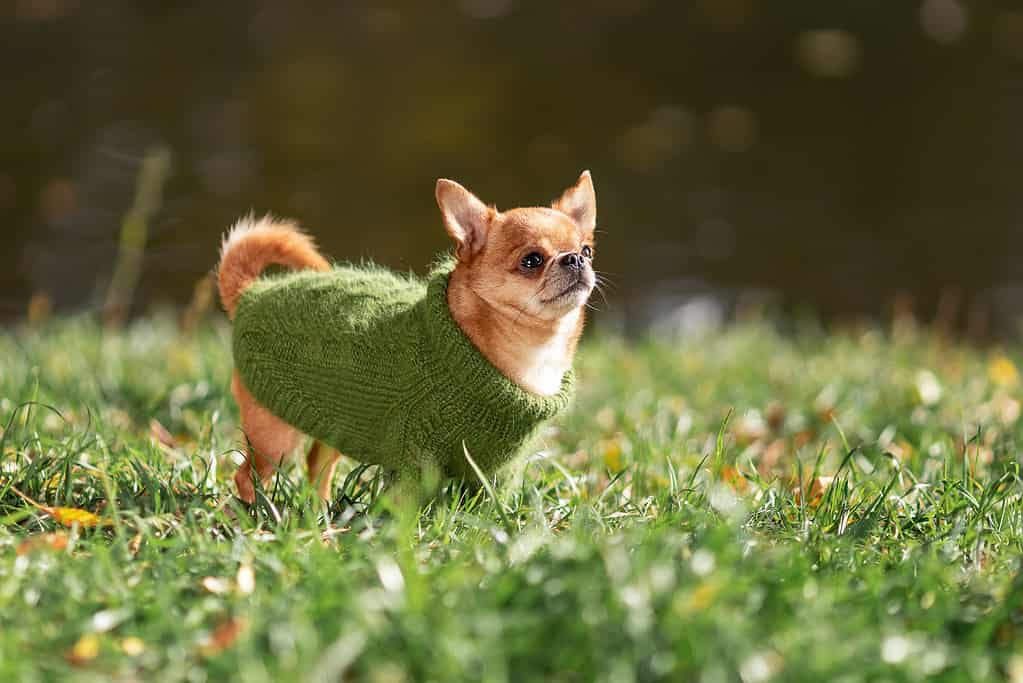
Pomeranians and Chihuahuas are the most active, energetic breeds in the toy group category so plan for at least 30 minutes of daily exercise.
©iStock.com/Irina Nedikova
The two dog breeds have medium energy, which suggests that a 30-minute exercise every day is enough to keep them in great shape and prolong their lifespan. Pomeranians and Chihuahuas are the most active, energetic breeds in the toy group category.
Hence, Chihuahuas and Pomeranians aren’t the best breeds for you if you’re seeking a lap dog that is content to sprawl all day without needing any exercise or useful movement. The dog breeds enjoy short walks followed by interactive games that’ll keep them busy all day.
Also, don’t leave your Chihuahua or Pomeranian bored and alone in the house all day long because they may turn to destructive behaviors and wreak havoc on your home to keep themselves entertained.
Chihuahua vs. Pomeranian: Temperament
Although Pomeranians and Chihuahuas have the same behavior and personality, Pomeranians are known to bark more, causing a lot of noise. If you reside in an apartment with a strict noise policy, you’re better off with a Chihuahua than a Pomeranian.
Both breeds are bold and courageous, which is also their biggest weakness because they often end up in risky situations.
Pomeranians and Chihuahuas always develop a deep connection with their human companions, causing them to crave a lot of attention and develop separation anxiety when left alone. If your pet constantly chews your items and destroys furniture whenever left alone or shows signs of stress, such as panting and trembling before you go, they have separation anxiety.
Moreover, check whether your little companion has any self-inflicted wounds, such biting its tail or overly licking its paw. Your Pomeranian or Chihuahua may want to spend more time with you if they whine, howl, or pace repeatedly. We recommend finding a sitter to watch your pet and keep them company instead of leaving them alone. A few hours of separation may not seem much to you, but they’re long in dog years, given that your pet only lives for 15 to 20 years maximum.
Which Breed Is Perfect for You?
Both dog breeds are likable and pleasant, guaranteeing you a stellar time experiencing what it’s like to be loved by a fluffy loyal pet.
If you’re looking for a pet that’s easy to maintain, requires little daily grooming, has an aggressive nature, doesn’t eat a lot, will love you forever, and will stick around for up to 15 years, then you need a Chihuahua in your life.
On the other hand, if you desire a pet that’ll always get excited when you come back home, bark sternly at people you don’t like, is easy to train, is very territorial and defensive, and will stay by your side for up to 20 years, you need to get yourself a Pomeranian. Expand your family today with the best dog breed of your choice.
Ready to discover the top 10 cutest dog breeds in the entire world?
How about the fastest dogs, the largest dogs and those that are -- quite frankly -- just the kindest dogs on the planet? Each day, AZ Animals sends out lists just like this to our thousands of email subscribers. And the best part? It's FREE. Join today by entering your email below.
Thank you for reading! Have some feedback for us? Contact the AZ Animals editorial team.

